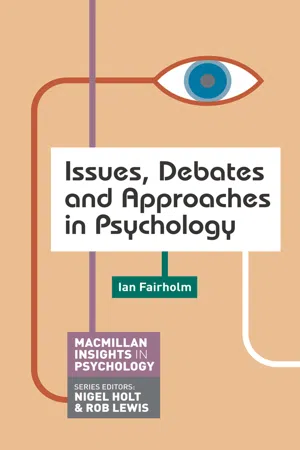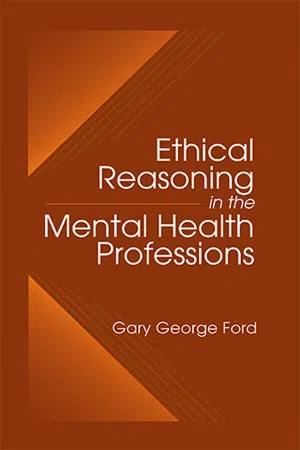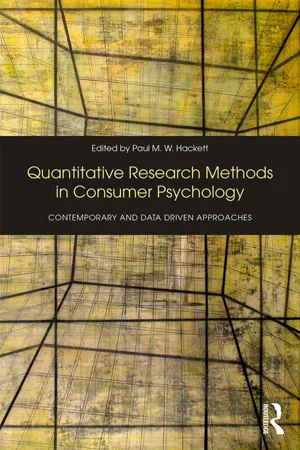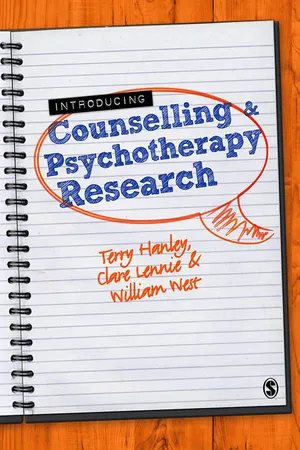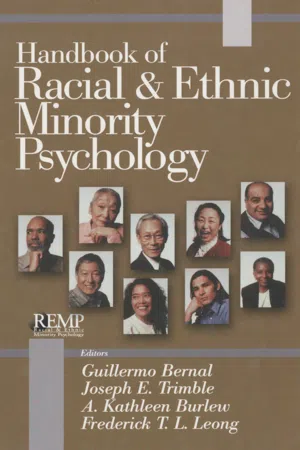Psychology
Ethical Issues and Ways of Dealing with Them
Ethical issues in psychology refer to moral dilemmas that may arise in research, therapy, or professional practice. Ways of dealing with these issues include obtaining informed consent, maintaining confidentiality, and ensuring the well-being of research participants and clients. Ethical guidelines and codes of conduct provide a framework for addressing these issues and promoting ethical behavior within the field of psychology.
Written by Perlego with AI-assistance
Related key terms
1 of 5
12 Key excerpts on "Ethical Issues and Ways of Dealing with Them"
- eBook - ePub
- Ian Fairholm(Author)
- 2012(Publication Date)
- Bloomsbury Academic(Publisher)
The currency and relevance of ethical guidelines have always been important issues but are particularly important now as the technologies used in psychological research are regularly changing. The use of the Internet, for example, as both a research object and a medium for data collection, has developed significantly since the 1990s, and in a relatively short space of time the range of methodologies used and topics addressed by Internet-based research has increased greatly (Bell & Kennedy, 1999). Internet-based research is just one example of how psychological research can change dramatically over time and can throw up new ethical issues and challenges that might not even have been contemplated in earlier times.Definition of ethicsOf course ethical issues are not unique to psychology. The term ‘ethics’ refers to a very broad range of topics and areas but can basically be considered to refer to a series of rules and guidelines that are useful and important when carrying out interactions with people and animals.As with most issues and debates within psychology, the origins of the consideration of ethical issues can be found within philosophy. Philosophers have considered, over the course of many centuries, concepts such as good and evil, right and wrong, equality and justice, and they have also sought answers to questions such as ‘What does it mean to live a good life?’ Many of these concepts and questions are not really directly appropriate to the field of psychology, but ethical issues are not just a series of philosophical quandaries – applied ethics is a discipline within philosophy that is specifically interested in how theoretical ethical issues apply to real-life situations.Psychology is involved with a number of real-life situations that raise ethical issues, and these mainly relate to the duty of care that psychologists have, whether to patients or clients in the case of clinical psychologists or psychotherapists, or to participants or subjects in the case of psychological research. Fundamentally, the basic ethical issues raised in psychology are not surprising, nor are they particularly different from those found in other occupations or sciences, though one distinction that psychology shares with some other sciences is that it studies both animals and human beings. - eBook - ePub
- Richard Keegan(Author)
- 2020(Publication Date)
- Bloomsbury Academic(Publisher)
2 Ethical Considerations: Protecting the Client, Yourself and Your Profession2.1 Introduction and overview
This chapter highlights the importance of ethical considerations as the very foundation of a sport psychologist’s practice, emphasizing that ethical issues permeate every aspect of the sport psychologist’s role. Put simply, ethical considerations pertain to morals – and can be construed both as an outcome of practice and a process one undertakes (Hays, 2006; also called ‘virtue’ ethics by Aoyagi & Portenga, 2010). Definitions of ethics as an outcome include both codes of behaviour considered correct; or the moral fitness of a decision, or course of action. In contrast, ethics as a process can be defined as the philosophical study of the moral value of human conduct and of the rules and principles that ought to govern it. In the words of Pope and Vasquez (1998, p. xiii), ethics can also be ‘a process through which we awaken, enhance, inform, expand and improve our ability to respond effectively to those who come to us for help’. Notably, if one has a strong ethical process, then the resultant ethical outcomes should be much more defensible.In this chapter, we will review what various governing bodies’ codes of conduct have to say on the matter – and notably that all codes of conduct focus on the avoidance of harm, not (necessarily) the effectiveness of one’s advice. Real-life case studies that have been experienced first-hand are used to illustrate the prevalence and importance of ethical issues in sport psychology. Core concepts are drawn from the code of conduct, illustrated and explored, including the avoidance of harm, competence and confidentiality; managing multiple relationships, informed consent, personal conduct and integrity; keeping accurate records; avoiding conflicts of interest, termination of the relationship and others. Where absolute ‘red lines’ exist these are noted, and equally where there are no simple answers, the key issues are mapped out to help inform the sport psychologist’s decision process. The chapter finishes by providing worksheets and sample forms, in order to assist the reader in understanding and managing their own ethical practices. - Gary G. Ford(Author)
- 2000(Publication Date)
- CRC Press(Publisher)
207 11 Ethical Issues in Research Most mental health professionals conduct research during their academic training and many continue to pursue research as an important part of their professional activity. Behavioral research is generally conducted to test specific hypotheses arising from psychological theories. That is, researchers have ideas about the variables influencing some psychological phenomenon, and they test their expectations about those variables under specified conditions. Thus, the first topic to be addressed in this chapter is the ethical significance of psychological theory construction. Unfortunately, some researchers fail to recognize the tremendous importance of the ethical issues that arise in planning and conducting research, perhaps because they assume that they are simply conducting objective “science” when they take on the role of researcher. However, ethical considerations are as important in research settings as they are in clinical practice. In both cases, there is great potential for harm, as well as benefit, to those affected by the professionals’ decision making. Concern about the potential for harm to human research participants initially focused on biomedical research. However, notable instances of participants being harmed emotionally by behavioral studies, like Milgram’s (1963) research on obedience to authority, increased awareness of the ethical complexity of behavioral research. Milgram (1963) deceived the participants in his study by making them believe they were administering shocks each time the participant they were paired with (actually, a confederate of the experimenter) made an error on a paired associates learning task. Actually, no one was being shocked. Participants became increasingly upset as they were instructed to administer stronger and stronger shocks, but most of them continued to obey the experimenter’s instructions.- eBook - ePub
Forensic Psychology
A Guide to Practice
- G.H. Gudjonsson, L.R.C. Haward(Authors)
- 2016(Publication Date)
- Routledge(Publisher)
4 ETHICAL AND PROFESSIONAL ISSUESIntroduction
Scientific and professional organisations are increasingly developing formal standards of behaviour for their members. These are normally presented in the form of a code, which outlines the kind of behaviours that are consistent with those professional standards and those that violate the code. Lindsay (1996) argues that an ethical code has two distinct purposes. First, it is intended to regulate inappropriate behaviour, which is concerned with minimum or mandatory professional standards and it typically gives descriptions of behaviours that are unacceptable and are likely to justify a complaint. Secondly, the aim is to promote optimal or aspirational behaviour through the use of guidelines about good practice. Therefore, a good professional code should help psychologists to stay out of trouble and hopefully also improves their professionalism and good practice.According to Lindsay (1996), psychology has experienced a particular difficulty in devising an ethical code because it is both a scientific and applied discipline, comprising several distinct fields of professional activity, such as those of educational, occupational, clinical and criminological psychology. Each may raise its own ethical concerns. Another problem is that for many ethical issues there are varied opinions within psychology about what exactly constitutes unethical behaviour (Lindsay, 1996). Pfeifer and Brigham (1993) raise concern about the increasing number of non-clinical forensic experts, such as academics, and the additional ethical dilemmas they face due to conflict over the blurred distinction between their role as an advocator versus an educator without having any recognised standards or guidelines.Psychological associations in different countries have each produced their own code of Conduct. Lindsay (1996) has reviewed the codes used in the USA, Canada and European countries, including the UK. There is a considerable overlap in terms of content and areas of ethical concern, but differences exist in terms of style, length and specificity. The European Federation of Professional Psychologists’ Associations (EFPPA) has produced a ‘meta-code’ which sets standards for all associations which are members of the EFPPA (Lindsay, 1996). - eBook - ePub
- Philip Banyard, Cara Flanagan(Authors)
- 2013(Publication Date)
- Routledge(Publisher)
(British Psychological Society, 2009a, p. 22)Another aspect of the issue is to recognize the damage that harassment can do to individuals at work and aim to reduce this wherever possible. We will explore this issue a little further in Chapter 6 .Addressing ethical misconductIf confronted about ethical behavior it is expected that psychologists will cooperate with any enquiry in a positive way. Also it is expected that, regardless of friendship or other constraints, psychologists will report any behavior of colleagues that they believe to be in conflict with the ethical code. This again is a tough one because it is one of the basic rules of human interaction not to snitch, but it is not acceptable to just turn a blind eye to situations you know are wrong.Limitations of ethical principles as a way of resolving ethical issues
In the above section we have given a summary of the BPS Code of Ethics and Conduct. We will now go on to comment on them. This means, inevitably, that we will be interpreting the principles from our own perspective and showing our own concerns and biases. You might well have a different view.Truly informed consent
The principle that gives the greatest puzzle surrounds the issue of consent. What do we mean by real consent and can we ever be fully informed about anything? The point about research, as Milgram noted, is that we do not know what is going to happen. If we did, there would be no point in the research. Therefore we cannot fully inform our participants. If we carry out simple studies devoid of any relevance to everyday life then it might be possible to identify all the necessary information to achieve real consent, but if we want to investigate how people conduct themselves in real situations we can never achieve this. If the consequence of this is that psychologists are doomed to carry out detailed studies of not very much, then their work will become ‘impeccable trivia’ (Reicher & Haslam, 2009, p. 469). Maybe we have to face the issue of consent head-on and recognize that we can never have fully informed consent. We will look at some examples of studies that have confronted this issue later in this chapter. - eBook - ePub
Quantitative Research Methods in Consumer Psychology
Contemporary and Data Driven Approaches
- Paul Hackett(Author)
- 2018(Publication Date)
- Routledge(Publisher)
One of the dark chapters in the history of American psychological practice and research occurred earlier this century, when some psychologists collaborated with the Central Intelligence Agency (CIA) and Department of Defense (DOD) on the use of enhanced interrogation techniques, which many would regard as torture (Risen, 2015). The psychologists collaborating with these agencies took steps to prevent the APA from revising its ethics rules to prevent members of the organization from assisting with enhanced interrogations of detainees. The APA amended its ethics rules after this collaboration became known to the public to clarify that when a psychologist’s ethical and legal obligations conflict, he or she should not violate human rights, and that, under no circumstance, should a psychologist directly or indirectly participate in torture or degrading, cruel, or inhumane treatment of individuals (American Psychological Association, 2015c).Exercises for Students
- Why is ethics important in psychological research? Do you think most psychology students take ethics seriously? Faculty?
- What do you consider to be some of the most difficult ethical issues in psychological research? The most interesting ones?
- Have you ever faced an ethical dilemma during your education or training as a psychological researcher? If so, what was it and how did you deal with it?
- Would you find it difficult to report someone for research misconduct? How would you deal with that situation?
- What are some of the issues that can arise in managing data? Can you think of dishonest of example of dishonest data analysis or interpretation that does not involve fabrication or falsification?
- Have you ever been an author on a scientific paper? Would you like to be? How should authorship issues be decided?
- Do you think it is sometimes acceptable to deceive human participants in experiments? Why or why not?
Note
1 .This research was supported by the Intramural Program of the National Institute for Environmental Health Sciences (NIEHS) and the National Institutes of Health (NIH). It does not represent the views of the NIEHS, NIH, or U.S. government.References
Akhabue, E., & Lautenbach, E. (2010). “Equal” contributions and credit: An emerging trend in the characterization of authorship. Annals of Epidemiology, 20 - eBook - ePub
The Routledge International Encyclopedia of Sport and Exercise Psychology
Volume 2: Applied and Practical Measures
- Dieter Hackfort, Robert Schinke, Dieter Hackfort, Robert Schinke, Robert J. Schinke, Dieter Hackfort, Robert J. Schinke(Authors)
- 2020(Publication Date)
- Routledge(Publisher)
Ethical conflicts cannot be completely avoided in most professions, and this is also true for sport psychology – in regard to research, as well as application. Often, conflicts in regard to values lead to difficult ethical decisions and force practitioners to ask questions about the “right thing to do”. Sometimes, this involves considering whether the right ethical decision is consistent with the law. Although, in some cases, ethics and the law overlap, there are many professional issues that the law does not address and occasions when the law and ethical reasoning may lead to different conclusions. Furthermore, elements in codes maybe insufficient or inappropriate, open to interpretation, and limited in the situations they address; new situations and arenas of practice can arise, including new potentials for ethical issues. As codes of ethics are revised only periodically, new ethical challenges often are not addressed until they have been discussed sufficiently and covered in a subsequent revision. Some would like to believe they can rely on their value system in specific situations, but not all values are equally justifiable in a given professional setting. This is a further reason for the necessity for ongoing discussion of ethical guidelines, consultation and exchange of experiences, and training to ensure appropriate interpretation and application.References
Ad Hoc Joint Committee. (2008). Universal declaration of ethical principles for psychologists . Retrieved from www.am.org/iupsys/resources/ethics/2008-universal-decl-report.pdfAdams, G., Kurtiș, T., Salter, P. S., & Anderson, S. L. (2012). A cultural psychology of relationship: Decolonizing science and practice. In O. Gillath, G. Adams, & A. D. Kunkel (Ed.), Relationship science: Integrating evolutionary, neuroscience, and sociocultural approaches (pp. 49–70). Washington, DC: American Psychological Association.American Counseling Association. (2014). ACA code of ethics. Retrieved from www.counseling.org/resources/aca-code-of-ethics.pdfAmerican Psychological Association (APA). (1953). Ethical standards of psychologists . Washington, DC: Author.American Psychological Association (APA). (1959). Ethical standards of psychologists. American Psychologist , 14 , 279–282.American Psychological Association (APA). (2002). Ethical principles of psychologists and code of conduct. The American Psychologist , 57 , 1060–1073.American Psychological Association (APA). (2016). Revision of ethical standard 3.04 of the “ethical principles of psychologists and code of conduct” (2002, as amended 2010). American Psychologist , 71 , 900.Andersen, M. B., Van Raalte, J. L., & Brewer, B. W. (2001). Sport psychology service delivery: Staying ethical while keeping loose. Professional Psychology: Research and Practice , 32 , 12–18.Aoyagi, M. W., & Portenga, S. T. (2010). The role of positive ethics and virtues in the context of sport and performance psychology service delivery. Professional Psychology: Research and Practice - eBook - PDF
- Ronald D. Francis(Author)
- 2010(Publication Date)
- Wiley-Blackwell(Publisher)
Broad Issues of Practice 183 Ethics is essentially about human values. Since not all values are shared we are compelled to consider the issues we have in common; and those on which we divide. For instance, what may seem self-evident in one culture may be ethically repugnant to another. Ethics affords an opportunity to discuss and resolve these human values in a non-threatening frame of reference. That issue is compounded in developing countries where there is a weak-ening of indigenous methods of social control and coping, thereby creating either a need for central agencies of control, or the development of an agreed code of conduct. This applies to professional as well as to business contexts. As Cohen (1981) has noted, Third World countries undergoing social and developmental change find themselves open to political instabil-ity. As Cohen put it, such a change is ‘a significant feature of the Third World [with] its preponderance of military dictatorships, feudal overlords, religious despots or foreign masters’. Managing personal diversity It is a truism that there are organisational politics, much of which is normal, understandable, and often functional. The more worrying instances are where the politics are driven by factors beyond the norm, and become dys-functional. Among the factors which drive dysfunction are irresponsibility, incompetence, ignorance, madness, and malice. What does the beginner psychologist do when he or she finds that the organisational unit head is a malicious character who gains satisfaction from the control and/or discom-fort of others? When is heroic social intervention called for when the organ-isation unit head is psychologically unbalanced? For someone early in their career this can be doubly disconcerting: first, because of the direct effect of the dysfunctional control; and second, because the beginner does not have the background and experience to know how dys-functional and destructive that behaviour can be. - Terry Hanley, Clare Lennie, William West, SAGE Publications Ltd(Authors)
- 2012(Publication Date)
- SAGE Publications Ltd(Publisher)
Counselling by its very nature needs to be ethical and fixed to an appropriate framework (such as BACP, BPS or HCPC – see the end of the chapter for references to these) in order for it to hold safely the work of both client and counsellor. The ways in which these will be played out however will be dependent on the context of your counselling practice. The overlap between therapeutic practice and research is considerable, and ethics is another area where the counsellor researcher will be in a strong position to understand the requirements for a research project to be ethically sound. We now move on to consider the ethical issues that are inherent to your practice and the ways in which these principles might or might not be transferred to research into therapy.ACTIVITY 15: What does it mean to be an ethical professional?
When discussing ethical behaviour in everyday life there are fundamental rights and freedoms that we would hope for, for example that we respect others in a way that we would hope to be respected. Psychologists, counsellors and indeed researchers are in a position of authority and this needs to be attended to and addressed in the various professional relationships that we encounter in our work. Let’s just stand back for a moment and reflect on the ethical principles that we bring to our practice. Often these can be so inherent in what we do that we can skim over their importance.This activity attempts to:- remind you of the ethical underpinnings of your practice
- encourage you to reflect upon why these considerations are important to your therapeutic work and
- help you to consider the extent to which these practices might transfer to the research arena.
The activity
In this activity we ask you to reflect on your therapeutic practice and to consider what the ethical principles are that guide your work. In a similar way we then ask you to consider the usefulness of these principles when undertaking research.In the first task we ask you to reflect upon what ethical principles you work to as a counseller or psychotherapist. In doing so, try not to get too hung up on ethical frameworks. Think about the nuts and bolts of your minute-by-minute practice in keeping you and your client safe in the work that you undertake together. Once you have done this then think how these actions fit into an ethical framework.- Mark E. Maruish, E. Anne Nelson(Authors)
- 2001(Publication Date)
- Routledge(Publisher)
The ethical issues that are discussed later most commonly arise with regard to the provision of psychotherapeutic services. This point is reflected in the discussion of these issues in the professional literature. These same issues, however, generally are pertinent to discussions of psychological testing in MBHOs. As necessary and appropriate, issues that are generally identified as arising from the provision of psychotherapy will be extrapolated to the provision of psychological testing and assessment services. General approaches to dealing with these issues also will be provided. Following this, other professional issues and concerns relevant to testing activities in MBHOs and identified by Eisman et al. (1998) in their PAWG report are discussed. Here also, proposed solutions to these matters are discussed. ETHICAL ISSUES AND CONCERNS There are a number of principles and standards in APA’s Ethical Principles document that bear directly or indirectly upon appropriate and ethical use of psychological testing and assessment in MBHOs systems. The most obvious, of course, is Standard 2, Evaluation, Assessment, and Intervention. Also relevant, however, are those principles and standards that are related to conflict of interest, competence, integrity, confidentiality, informed consent, welfare of the consumer, and social responsibility. Acuff et al. (1999) contend that the ethical dilemmas that are most likely to occur in organized systems of care involve informed consent, confidentiality, abandonment, and utilization management/review- Gerald Corey(Author)
- 2020(Publication Date)
- Cengage Learning EMEA(Publisher)
Even responsible practitioners differ over how to apply established ethical principles to specific situations. In your professional work you will deal with questions that do not always have obvious answers. You will have to assume responsibility for deciding how to act in ways that will further the best interests of your clients. Throughout your professional life you will need to reexamine the ethical ques- tions raised in this chapter. You can benefit from both formal and informal oppor- tunities to discuss ethical dilemmas during your training program. Even if you resolve some ethical matters while completing a graduate program, there is no guar- antee that these matters have been settled once and for all. These topics are bound to take on new dimensions as you gain more experience. Oftentimes students burden themselves unnecessarily with the expectation that they should resolve all potential LO15 LO16 Copyright 2017 Cengage Learning. All Rights Reserved. May not be copied, scanned, or duplicated, in whole or in part. Due to electronic rights, some third party content may be suppressed from the eBook and/or eChapter(s). Editorial review has deemed that any suppressed content does not materially affect the overall learning experience. Cengage Learning reserves the right to remove additional content at any time if subsequent rights restrictions require it. ETHICAL ISSUES IN COUNSELING PRACTICE 53 ethical problem areas before they begin to practice. Throughout your professional life, seek consultation from trusted colleagues and supervisors whenever you face an ethical dilemma. Ethical decision making is an evolutionary process that requires you to be continually open and self-reflective. Becoming an ethical practitioner is not a final destination but a journey that will continue throughout your career.- Guillermo Bernal, Joseph E. Trimble, A. Kathleen Burlew, Frederick T. L. Leong(Authors)
- 0(Publication Date)
- SAGE Publications, Inc(Publisher)
J CHAPTE The Ethical Practice of Psychology Ethnic, Racial and Cultural Issues LEONARDO M. MARMOL Seattle Pacific University C oncerns about the role of culture and code of ethics for the practice of psychotherapy. ethnicity on the theory and practice In 1948, a letter went out to 7,500 psychol-of psychology have had a checkered ogists requesting reports of ethical dilemmas history in American psychology. Some may they had encountered in practice. One say the same about psychology's concern thousand reports came back. about ethics in general. The American The Boulder Conference of 1949, which Psychological Association (APA) was promulgated the scientist-practitioner model founded in 1892 and incorporated legally in for clinical psychology, actually left psycho-1925. It functioned for 13 years without an therapy purposely vague and undefined. Ethics Committee. This was established in The conference did not explicitly make any 1938 but without written codes or guidelines pronouncements about ethical practice. It to govern its activities. was assumed that all practitioners would But today we have come to the realization adhere to high standards. The impetus for that ethnicity, race, and culture are ethical writing a code was, however, strong, and issues. The future of psychology as a force in such an effort continued. human affairs may well hang on how it Despite the opposition of such well-known addresses the multicultural milieu of 21st-psychologists as Calvin Hall, who in 1952 century America in a way that is relevant to stated that an ethics code would play into the all the people and not just a privileged few.
Index pages curate the most relevant extracts from our library of academic textbooks. They’ve been created using an in-house natural language model (NLM), each adding context and meaning to key research topics.
